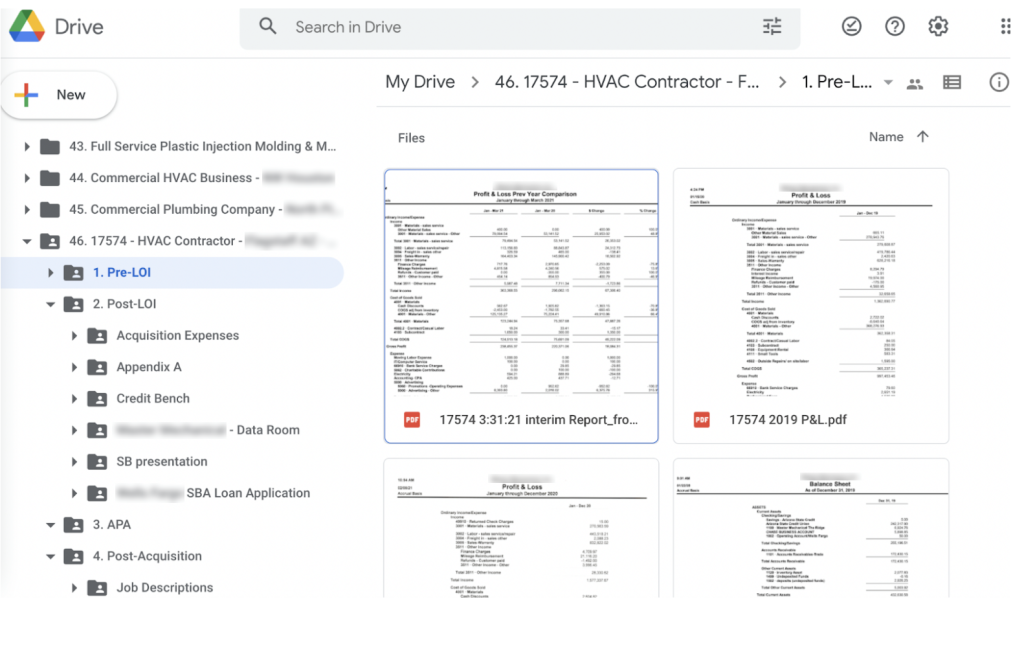- How a data room can help you analyze more deals than you thought possible
- Why we prefer the “batch approach” to the business search process
- What resources should be included in your data room
- Other considerations for your data room
It’s easy to get lost on the acquisition journey. There is so much information coming at you – from legal and financial documents to loan agreements and organizational charts – that you may lose track.
As you move forward with the process of finding a business, you will need to analyze so many deals that it may become overwhelming. But through careful organization and attention to detail, you can appraise more businesses than you thought possible.
Part of the process for Acquisition Entrepreneurs (AEs) working with Acquira requires that they bring deals to our Investment Committee (IC). These presentations allow us to provide feedback on the AE’s deal-sourcing methods, advise them, and help ensure they’re on the right path.
But before an AE can bring a deal to the IC, we recommend they analyze as many deals as possible. In fact, when creating your investment thesis, we recommend you systematically screen at least three businesses for every sector you’re interested in before iterating your thesis.
The Batch Approach To Business Acquisition
When most people begin looking for a business to buy, they will choose a few categories (like geography or industry) and begin their search. This often leads to them spending a few hours scrolling through sites like BizBuySell, possibly analyzing a business or two, waiting for replies, and then starting from scratch if those businesses don’t pan out. This is often the result of a poorly defined investment thesis and a lack of organization.
Acquira’s approach is slightly different and allows us to quickly score many deals. We take a numbers-based approach and understand that any given deal has a low probability of turning into an offer, so you must look at many deals simultaneously. To do this, you need an extra layer of organization: We recommend that our partners organize the business buying process through a combination of data rooms and a CRM (customer relationship management) platform.
We begin by requesting prospectuses from several different businesses. We take the information from those who respond and input it into our calculators. Acquira provides our partners with calculators that help you score each business and determine whether it’s worth looking at more closely. These tools are provided in our Accelerator Program.
Free Tool: Acquira’s SBA Model Calculator
The calculators allow us to disqualify certain businesses and determine whether others are worth pursuing. We then put that information into the CRM, which allows the buyer to analyze between 10 and 20 deals at any given time, each at a different stage of the sourcing process.
What Does a CRM Need?
Acquira has used several different CRMs in the past; we generally prefer Close, Freshworks CRM, and HubSpot.com. These systems have great support, simple onboarding, and an extensive knowledge base.
You should ensure that the CRM you choose can integrate with whatever email client you use to communicate with brokers.
There are a few key features that your CRM should have to effectively manage your pipeline:
- Pipeline View: This is a Kanban style view that quickly shows where deals are in your pipeline and where to prioritize your efforts. [Note: Kanban is a workflow management method for defining, managing, improving services designed to help you visualize your work.]
- Tasks & Reminders: Once you get into the thick of things you’ll find this useful to keep on top of the brokers and sellers when requesting information.
- Email Sync: This will help you keep all your email communication around specific deals in one place so you can go back and check historical communication if necessary.
- Phone Integration: This is optional but we found it much easier to have a phone integrated within the CRM so all the phone logs are attached to a specific deal if you need to review historical communication.
- Digital Document Signing: This one is also a nice to have” feature. But once you reach the point where documents are being sent back and forth, the ability to sign them digitally will speed up the process.
What Is A Data Room?

A data room, also known as a ‘data room’ or ‘virtual data room,’ is a space on the cloud where you can store, secure, and share all the data related to a deal. That data is often confidential or highly sensitive.
The phrase ‘data room’ evolved from the traditional means of keeping records, when files were stored in filing cabinets or private physical servers in their own room. Access to those rooms was tightly controlled, secured, and closely monitored.
More recently, data rooms have moved online to make sharing documents across great distances easier. A virtual data room can improve your overall acquisition experience, making things run more smoothly and efficiently. Still, given the often sensitive nature of the materials involved, virtual data rooms should have the same amount of oversight as their physical counterparts.
Data rooms are used by all manner of professionals, including companies, lawyers and legal teams, auditors, and investors. They are frequently part of the due diligence process for legal transactions, tenders, fundraising, and audits.
How To Keep Organized With The Help Of A Data Room
During the acquisition process, you will be inundated with information – anything from helpful tips to the documents required to close the deal. Keeping organized from the beginning will save you many headaches and keep everything flowing.
The typical acquisition process has many moving parts, with both buyer and seller requesting, exchanging, analyzing, and appraising information at various deal stages. Any tools used during this process should reflect that reality.
Fortunately, virtual data rooms allow you to control much of the process and see who is accessing which documents at any given time. As the person who sets up the data room, you can control who can access the information.
Different stages of the acquisition process will see different materials inputted into the data room. For example, pre-LOI documents might include the business prospectus, tax filings, earnings reports, and more.
Post-LOI, this virtual data room will continue to grow as you receive new documents, including tax returns, QOE analyses, legal documents, employee lists, job descriptions, vendors, and acquisition expenses.
Setting Up Your Data Room

While many paid options are available to Acquisition Entrepreneurs, we recommend you create your data room in Google Drive or a similar online and free storage option.
The steps to setting up a virtual data room are relatively simple:
- Begin by creating a folder and giving it a name.
- Link that folder to your CRM record (more on that later) for the deal. This allows you to reference it quickly.
- Place the prospectus and any other data you’ve collected into the folder.
- Create sub-folders with the headings “Pre-LOI,” “Post-LOI,” “APA,” and “Post-Acquisition.”
While actually setting up the data room is simple, staying organized takes more work. It is important to keep a separate folder for each potential acquisition and, within that folder, have separate folders for the appropriate SBA application, legal documents, and presentations pertaining to the deal.
You may need to show potential investors or lenders these documents, so they should be easily accessible. All of this should also be in chronological order, so be sure to update the data room as you receive new data.
Here is an example of a well-organized virtual data room:

Analyzing more deals will help you refine your investment thesis, but to truly apprize those businesses, you need to be organized.
A Directory of Resources
While the data room and CRM will help you keep track of the important documents and the overall progress of the deal, you should also assemble a directory of resources that can be used at each phase of the deal process.
We went into this in greater detail in our article “These Are The Vendors You Will Need During Your Business Acquisition Process,” but to quickly summarize, your directory should include the contact information for:
- Brokers
- Legal teams
- Financial firms
- Industry experts
- SBA lenders
- Integrators
- Digital marketing agencies
- IT consultants
- Staffing and training agencies
- Equipment & supply vendors
- Any vehicle procurement relationships
Conclusion
Being organized will also help you analyze more deals at once – the batch approach – to ensure you find the best deal possible.
While other business buyers are analyzing deals haphazardly, these data rooms will help you stay on top of each individual deal so you can be prepared to seize an opportunity when it presents itself.
Do you know anyone who was notably well-organized? Or, on the other hand, so disorganized that it was impressive they got anything done? We’d love to hear your stories in the comments below.
Segments of the above were taken from Acquira’s training materials, where we walk Acquisition Entrepreneurs through how to build their own data room as they appraise real deals. The first step to taking part in that training is to sign up for the Accelerator Program.
If you’d like to learn how Acquira can help with your acquisition journey, schedule a call with us today.
Key Takeaways
- We recommend you analyze at least three businesses for every sector you’re interested in at the beginning of your deal search.
- The best way to organize the information you collect is with a virtual data room.
- Combining a data room with a CRM allows you to analyze many deals at once.
- Your organizational efforts should include a Directory of Resources.
- Staying organized is the best way to beat the competition to find the best businesses.
Acquira specializes in seamless business succession and acquisition. We guide entrepreneurs in acquiring businesses and investing in their growth and success. Our focus is on creating a lasting, positive impact for owners, employees, and the community through each transition.



